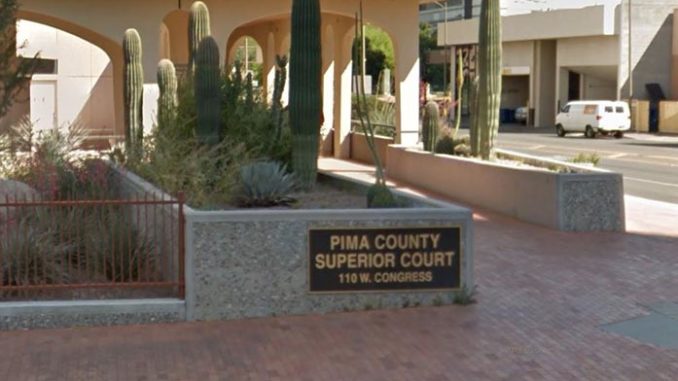
Jeremy David Millis is scheduled to go on trial next week for the second time on charges of first-degree murder for the January 2013 death of eight-month-old Conor James Kroviak. The jurors will hear often contradictory medical evidence as to the cause of the baby’s death.
What those jurors will not hear, a Pima County judge ruled earlier this week, is any testimony or evidence that Millis has been diagnosed with a mental condition that could have impacted his ability to voluntarily waive his Miranda rights.
Judge Howard Fell’s ruling means jurors can hear about Millis’ purported confessions to abusing the boy but they will not hear the opinions of two medical experts who say Millis is highly susceptible to suggestion.
The suggestibility issue causes Millis to say things to please others. particularly when those others are in a position of authority such as a police officer, according to the experts’ findings.
It is undisputed that Millis was babysitting young Conor on Jan. 24, 2013, shortly before the infant was rushed to the hospital in a worsening unresponsive condition. Millis was initially arrested on a charge of felony child abuse, but that charge was upgraded to first degree murder after the baby died a few days later.
Among the evidence put forth by the Pima County Attorney’s Office to support the murder charge were several post-Miranda comments Millis made to police, including one in which he mentions “choking” the infant due to frustration with the baby’s crying.
But the autopsy report from the Pima County Office of the Medical Examiner notes the baby’s cause of death as “diffuse hypoxic injury of the brain and blunt force injury of the head.” Some of the tell-tale signs of a choking action were also not noticed during the autopsy.
The first trial ended with Millis being convicted and sent to prison for life in 2015. That conviction was overturned in December 2020 due to concerns that Millis’ then-defense attorneys did not properly address whether Millis made his confessions or inculpatory comments voluntarily.
Millis was released from the Arizona Department of Corrections in July 2021 to await a retrial. His new attorney, Tom Higgins, has been arguing since then that the three statements Millis made to police detectives were not truly voluntary.
But Higgins does not allege the police intentionally violated Millis’ rights during their interrogations. Instead, the veteran defense attorney contends Millis has a peculiar mental condition or personality trait that makes him highly suggestible.
Higgins noted that during one police interview, Millis asserted he dropped the infant while babysitting. When confronted with the fact there was no evidence showing the boy’s injuries were the result of a fall or being dropped, Millis then said he had choked the baby.
Yet the autopsy report and other medical evidence do not point to strangulation nor choking as causing the boy’s death on Jan. 30, 2013, according to court documents.
The initial prosecution of Millis’s case was delayed several months while he underwent a competency evaluation. Later, Millis was found to be able to understand the charges and assist with his defense, the two requirements for competency to stand trial in Arizona.
After being in prison a few years, Millis was appointed a new attorney who filed a petition for post-conviction relief in 2019. The petition was assigned to a different Pima County judge.
The petition argued that his trial attorneys were ineffective for failing to attempt to discredit or preclude his inculpatory statements, particularly due to his “susceptibility to suggestion.”
To demonstrate prejudice had occurred, Millis’s post-conviction attorney Harriett Levitt was required to demonstrate to the court “that there is a reasonable probability that, but for counsel’s unprofessional errors, the result of the proceeding would have been different.”
The judge later overturned Millis’ convictions and ordered a new trial, finding Millis’s trial attorneys had fallen below “the general standard of care” by failing to seek suppression of the defendant’s incriminating statements to police and by failing “to present or attempt to present” evidence to the jury about Millis’ mental condition.
The Pima County Attorney’s Office, representing the State of Arizona, appealed that ruling but was unable to convince an appellate panel that Millis did not deserve a new trial.
And that is how Deputy County Attorneys Tai Summers and Victoria Otto came to be in Fell’s courtroom with Higgins on Aug. 28 for a hearing on suppressing Millis’ statements to police. Or in the alternative, to allow jurors to hear from medical experts about the suggestibility issue.
It was clear from Fell’s comments that he does not hold the same opinion toward the suggestibility claim as the prior judge. As a result, the trial will move forward next week in the same manner the first one did in 2015 – with no evidence presented to the jurors that Millis did not voluntary waive his Miranda rights.
The Pima County Attorney Laura Conover confirmed to Arizona Daily Independent that there has been no plea deal offered to Millis since the 2021 order for a new trial.
The county attorney’s office had no comment, however, as to the decision to move forward with a second trial in light of the conflicting medical evidence and the possibility Millis may not have intended to harm the baby back in 2013, if in fact he caused any injuries.
“Ethical rules 3.6 and 3.8 prohibit us from commenting on the facts and circumstances of a pending criminal case, because the right of both parties to have a fair trial before an impartial jury is paramount,” said PCAO spokeswoman Shawndrea Thomas.

